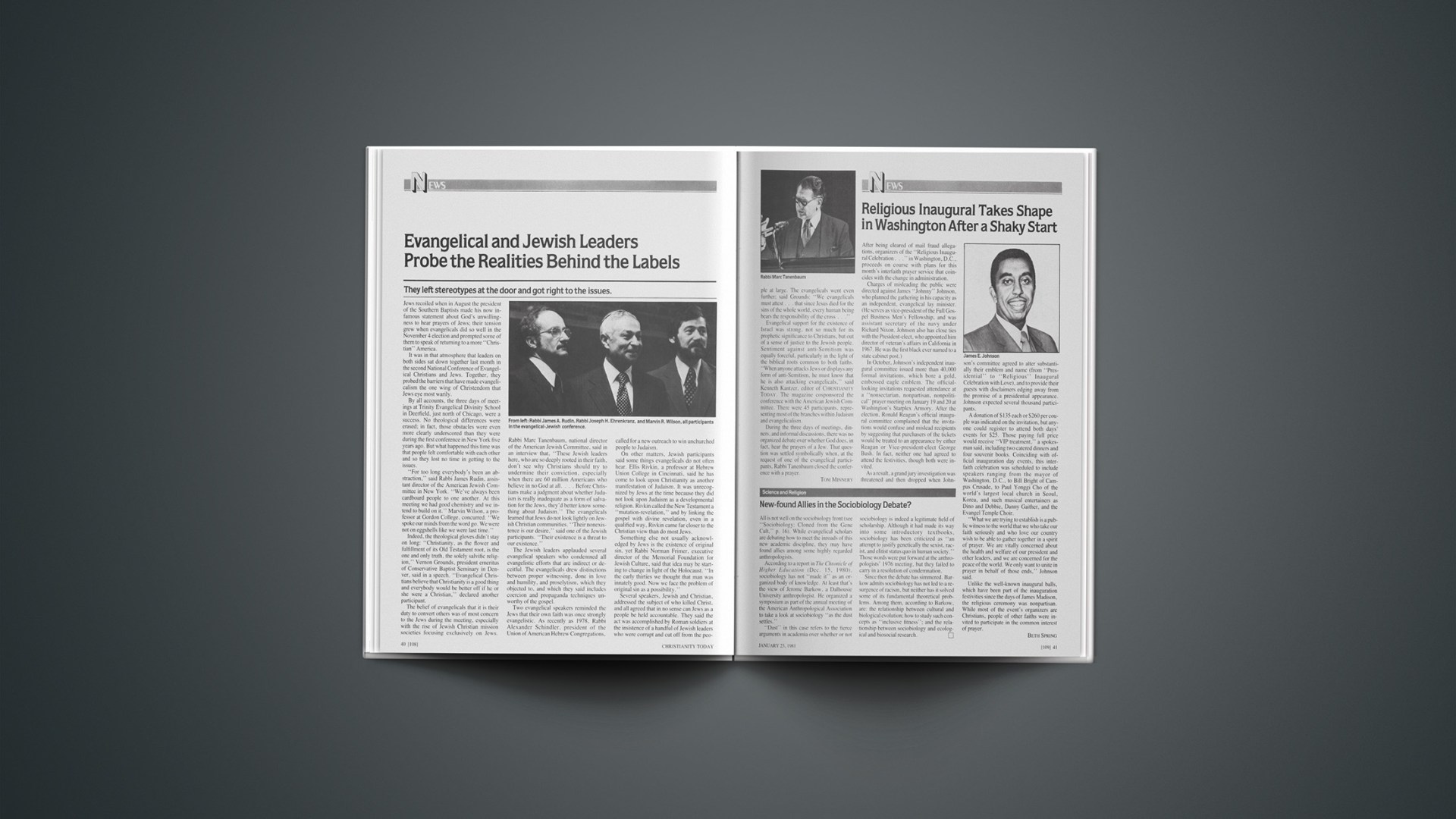They left stereotypes at the door and got right to the issues.
Jews recoiled when in August the president of the Southern Baptists made his now infamous statement about God’s unwillingness to hear prayers of Jews; their tension grew when evangelicals did so well in the November 4 election and prompted some of them to speak of returning to a more “Christian” America.
It was in that atmosphere that leaders on both sides sat down together last month in the second National Conference of Evangelical Christians and Jews. Together, they probed the barriers that have made evangelicalism the one wing of Christendom that Jews eye most warily.
By all accounts, the three days of meetings at Trinity Evangelical Divinity School in Deerfield, just north of Chicago, were a success. No theological differences were erased; in fact, those obstacles were even more clearly underscored than they were during the first conference in New York five years ago. But what happened this time was that people felt comfortable with each other and so they lost no time in getting to the issues.
“For too long everybody’s been an abstraction,” said Rabbi James Rudin, assistant director of the American Jewish Committee in New York. “We’ve always been cardboard people to one another. At this meeting we had good chemistry and we intend to build on it.” Marvin Wilson, a professor at Gordon College, concurred: “We spoke our minds from the word go. We were not on eggshells like we were last time.”
Indeed, the theological gloves didn’t stay on long: “Christianity, as the flower and fulfillment of its Old Testament root, is the one and only truth, the solely salvific religion,” Vernon Grounds, president emeritus of Conservative Baptist Seminary in Denver, said in a speech. “Evangelical Christians believe that Christianity is a good thing and everybody would be better off if he or she were a Christian,” declared another participant.
The belief of evangelicals that it is their duty to convert others was of most concern to the Jews during the meeting, especially with the rise of Jewish Christian mission societies focusing exclusively on Jews. Rabbi Marc Tanenbaum, national director of the American Jewish Committee, said in an interview that, “These Jewish leaders here, who are so deeply rooted in their faith, don’t see why Christians should try to undermine their conviction, especially when there are 60 million Americans who believe in no God at all.… Before Christians make a judgment about whether Judaism is really inadequate as a form of salvation for the Jews, they’d better know something about Judaism.” The evangelicals learned that Jews do not look lightly on Jewish Christian communities. “Their nonexistence is our desire.” said one of the Jewish participants. “Their existence is a threat to our existence.”
The Jewish leaders applauded several evangelical speakers who condemned all evangelistic efforts that are indirect or deceitful. The evangelicals drew distinctions between proper witnessing, done in love and humility, and proselytism, which they objected to, and which they said includes coercion and propaganda techniques unworthy of the gospel.
Two evangelical speakers reminded the Jews that their own faith was once strongly evangelistic. As recently as 1978, Rabbi Alexander Schindler, president of the Union of American Hebrew Congregations, called for a new outreach to win unchurched people to Judaism.
On other matters, Jewish participants said some things evangelicals do not often hear. Ellis Rivkin, a professor at Hebrew Union College in Cincinnati, said he has come to look upon Christianity as another manifestation of Judaism. It was unrecognized by Jews at the time because they did not look upon Judaism as a developmental religion. Rivkin called the New Testament a “mutation-revelation,” and by linking the gospel with divine revelation, even in a qualified way, Rivkin came far closer to the Christian view than do most Jews.
Something else not usually acknowledged by Jews is the existence of original sin, yet Rabbi Norman Frimer, executive director of the Memorial Foundation for Jewish Culture, said that idea may be starting to change in light of the Holocaust. “In the early thirties we thought that man was innately good. Now we face the problem of original sin as a possibility.”
Several speakers, Jewish and Christian, addressed the subject of who killed Christ, and all agreed that in no sense can Jews as a people be held accountable. They said the act was accomplished by Roman soldiers at the insistence of a handful of Jewish leaders who were corrupt and cut off from the people at large. The evangelicals went even further; said Grounds: “We evangelicals must attest … that since Jesus died for the sins of the whole world, every human being bears the responsibility of the cross …”
Evangelical support for the existence of Israel was strong, not so much for its prophetic significance to Christians, but out of a sense of justice to the Jewish people. Sentiment against anti-Semitism was equally forceful, particularly in the light of the biblical roots common to both faiths. “When anyone attacks Jews or displays any form of anti-Semitism, he must know that he is also attacking evangelicals,” said Kenneth Kantzer, editor of CHRISTIANITY TODAY. The magazine cosponsored the conference with the American Jewish Committee. There were 45 participants, representing most of the branches within Judaism and evangelicalism.
During the three days of meetings, dinners, and informal discussions, there was no organized debate over whether God does, in fact, hear the prayers of a Jew. That question was settled symbolically when, at the request of one of the evangelical participants, Rabbi Tanenbaum closed the conference with a prayer.










